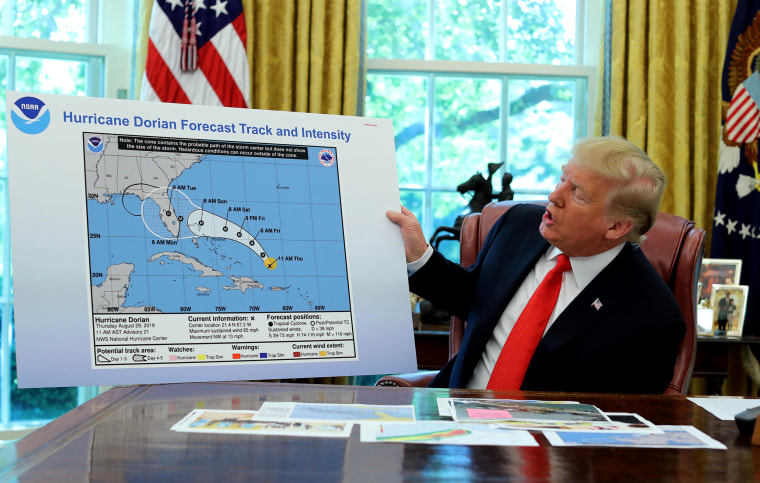I can appreciate why parts of the political world dismissed "Sharpiegate" as trivial. After all, for some observers, the whole controversy -- to the extent that it deserved to be called a "controversy" was built around Donald Trump needlessly drawing on a map.
Sure, the argument went, it was yet another example of the president's pettiness and foolishness, but there wasn't anything especially substantive about the fiasco.
I've long disagreed with this perspective, and an inspector general report issued this week helped underscore why.
The Commerce Department inspector general issued a delayed and harshly critical report laying out how political pressure originating from the White House resulted in the issuance of a poorly crafted and unsigned National Oceanic and Atmospheric Administration (NOAA) statement on Sept. 6, 2019.
Let's circle back to our earlier coverage for those who may need a refresher on how we arrived at this point.
Last summer, as Hurricane Dorian approached the United States, Donald Trump published a tweet that included Alabama among the states "most likely be hit (much) harder than anticipated." Soon after, the National Weather Service told the public the opposite. When news outlets noted the president's error, Trump took great offense, insisting he was right, facts be damned.
It set in motion a series of increasingly ridiculous events, which included the National Oceanic and Atmospheric Administration issuing an unsigned written statement endorsing the Republican's false claims, while also criticizing professionals at the National Weather Service for having told the truth.
As part of the same fiasco, Trump displayed a map in the Oval Office in which he literally took a pen and drew a bump onto a NOAA forecast map in order to bend reality to his will. "Sharpiegate" was born.
An independent investigation conducted on the NOAA's behalf found that its leaders "violated codes of the agency's scientific integrity policy," which was hardly a surprising conclusion.
The Commerce Department's inspector general went further and shined a light on the White House's direct involvement in the mess. From the Washington Post's report:
According to the inspector general’s report -- which does not include redactions, not even for presidential privilege -- then-acting White House chief of staff Mick Mulvaney instructed Commerce Secretary Wilbur Ross on Sept. 5 to have the public record corrected in favor of the president, and Mulvaney and Ross were involved in the statement approval process.
Outraged that the National Weather Service had told the public the truth, Mulvaney wrote on Sept. 5 to the cabinet secretary, “As it currently stands, it appears as if the NWS intentionally contradicted the president. And we need to know why." Apparently in reference to the president, Mulvaney added, “He wants either a correction or an explanation or both."
Why should anyone care? Part of the significance stems from changes to public perceptions in the wake of politicized agencies: if the public believes non-political bureaus such as the National Weather Service and the National Oceanic and Atmospheric Administration have become cogs in a West Wing political operation, Americans may filter important warnings -- about natural disasters, among other things -- through a political lens. That in turn, carries real consequences.
Similarly, as the inspector general's report added this week, “The broader, longer-term consequence is that NOAA’s rebuke of the NWS Birmingham office could have a chilling effect on NWS forecasters’ future public safety messages." In other words, federal forecasters may curtail future public alerts for fear of upsetting an intemperate and easily confused president.
But taking a step back, "Sharpiegate" also offers a case study in the White House prioritizing public-relations considerations over reality-based assessments from experts and government scientists.
We couldn't have known it at the time, but it was a precursor to Team Trump's handling of the coronavirus crisis that unfolded soon after.
